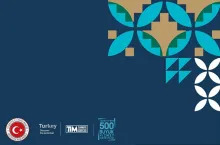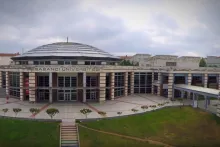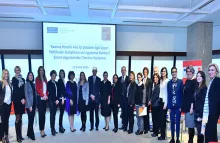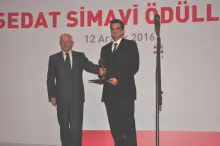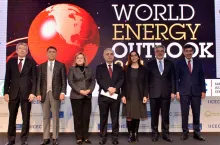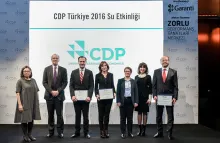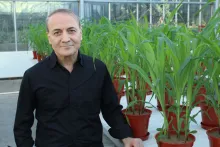The Sabancı University Istanbul International Center for Energy and Climate (IICEC) hosted the Turkish launch event of the World Energy Outlook 2016 report.

International Energy Agency Executive Director Dr. Fatih Birol presented the World Energy Outlook 2016 report at the meeting.
"Growth will be enabled by renewable energies."
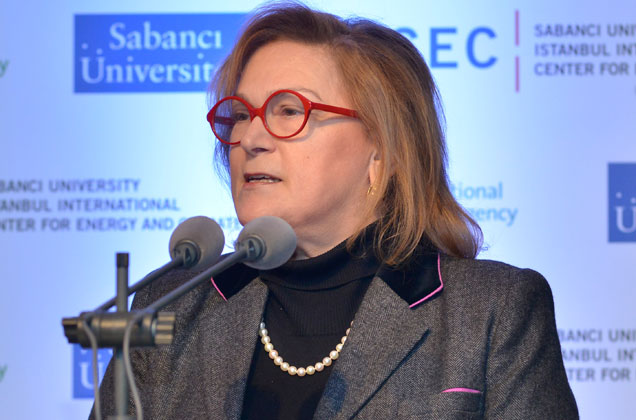
Introductory remarks of the meeting were delivered by Sabancı University Founding Board of Trustees Chair Güler Sabancı.
Güler Sabancı said, “We witness highly influential global trends. Rapid urbanization, digitalization and electrification make energy even more vital. Energy has strategic importance for the quality of life in societies and the healthy functioning of economies. It continues to be a major priority.
According to the World Energy Outlook, global energy demand is expected to increase by 30% until 2040. The most growth will occur in renewable energies. Forecasts suggest that the share of renewables in the production of electricity will increase from 23% to 37%. According to other calculations, an additional investment of 44 trillion dollars in today's prices will take place until 2040. A further 23 trillion dollars will be spent for improvements in energy efficiency.
All of this suggests that the future of energy has many challenges as well as opportunities. More competition, a favorable investment climate, increased efficiency, advanced technologies and disruptive innovation will be the cornerstones to a successful transformation in energy. Efficiency lies at the crux of the matter. The role and importance of the consumer grow as well. New business models and practices that focus on the consumer must gain more currency and functionality. Together with technological developments in energy, we have begun to discuss new concepts and include them in our projections. Ideas such as dispersed production, smart grids, energy storage, demand management and electric vehicles will be definitive in shaping the future of the energy sector. Adopted in early November, the Paris Convention will play a critical role in improving the sustainability of the energy sector."
Güler Sabancı continued: "Energy is a strategic sector for our country. Our energy demand grew by 4% over the last decade, which is high above the global average. Despite this growth, energy consumption per capita is still at 40% of the OECD average. This points to an immense potential for growth in energy demand. Our main priority is to cater for this demand with reliable, competitive and sustainable means. We must manage energy supply and demand very well.
We are aware that the Ministry dedicates significant resources to this matter. We are enthusiastically supportive of their efforts. The energy sector in Turkey underwent great changes lately. 75 billion dollars were invested in the electricity sector in Turkey in the last 10 years.
Most of these investments were made by private actors relying on the belief that the Turkish energy industry would grow and a competitive, liberal market would emerge.
The electricity and natural gas sectors in Turkey overtook many other critical sectors with a combined market volume of TL 100 billion. Great steps were taken for the liberalization of our electricity market, led by the Ministry of Energy and the Energy Market Regulatory Authority.
The installed capacity in Turkey almost doubled in the last decade. Large-scale privatization projects were concluded in production. But we must continue. Privatization in distribution is complete. We must work on encouraging technology and efficiency investments and operations, and reinforcing customer satisfaction until the end of the current distribution tariff period. EPİAŞ, the energy exchange, started operation and made great achievements in transparency and depth. We have had some headway in retail liberalization, albeit not at the desired level. Now we must quickly take further steps in liberalization and have a fully-functional market that favors the consumer. To do so, we must strengthen our energy markets with better regulatory framework, more competitiveness, transparency, and of course, predictability. We must have a competitive market that is an accurate reflection of supply and demand, efficiency, and costs. We must seize the opportunity yielded by excess supply and low commodity prices to take bold steps in this direction.
Our intent behind establishing IICEC was to build it into a "pole star" for the industry and Turkey.
As we move towards this goal, we will have an important addition to IICEC in 2017.
We are delighted to announce that Dr. Carmine Difiglio, an advisor to the Secretary of Energy in the Obama administration, will be appointed IICEC Director in January.
IICEC's efforts to produce objective and high-quality research in energy and climate issues, and to develop solutions for a sustainable energy future in our region and the world will be taken to the next level with Dr. Difiglio among us.
IICEC became a known and respected networking platform in its region and the globe with its achievements so far. We are confident that it will continue its success."

There is no one scenario about the future of global energy; various policies will influence the outcome.
Following introductory remarks, International Energy Agency Executive Director Dr. Fatih Birol presented the World Energy Outlook 2016 report. Fatih Birol said:
"In 2015 and 2016, approvals for new conventional crude oil projects have been at the lowest level since the 1950s. If this were to continue for another year, oil markets can face a new risk in the near future: lack of enough new projects.
If this occurs, exceptional efforts will be needed to ensure that a great divide does not occur between supply and demand in a few years. If investments cannot recover or the growth in demand does not fall sharply, oil may enter another period of fluctuations.
Coal had been the greatest contributor to energy in the last twenty-five years. However, coal consumption will fall considerably over the next 25 years. The largest growth will occur in renewable energy. Coal is still important. China accounts for half of the world's coal consumption. But it has been on the decline for the last two years. The reason for this is not climate change but air pollution and the health of people living in cities. Meanwhile, coal consumption in India and Southeast Asia are on the rise. Coal remains the cheapest means to produce electricity. It is a great luxury for people who do not have refrigerators at home to worry about possible climate change in 2050. This must be a consideration when fulfilling Paris commitments. The Paris Convention is a framework agreement, and its impact on energy will depend on how the objectives of the convention reflect on the actual policies of governments. While the world's need for energy grows, millions of people are still deprived of energy.
In our main scenario, 30% growth in global energy demand until 2040 means an increase in the consumption of all current fuels; however, global totals mask important trends and significant changes in the fuel mix. Furthermore, hundreds of millions of people will still have no access to energy services by 2040.
Climate commitment and objectives
Countries have achieved their Paris Convention objectives in general, and have even exceeded them in certain circumstances, which is adequate to slow the CO2 emissions related to global energy, but not enough to keep temperature change below 2°C.
2°C is difficult: the path to 1.5°C is uncharted territory.
Current commitments are not enough to limit global temperature increase to below 2°C. Taking this down to 1.5°C is unimaginable at best.
To have a better idea about the importance of energy efficiency for Europe, we can say that security of supply is as important for gas as it is for oil. All ministries are maintaining joint efforts for security of supply in gas. Most of the natural gas consumed is used for heating households. The number of households in Europe increased by almost 20 million in the last 15 years. But the demand for gas declined instead of increasing. There are two reasons. First, standards were imposed on heating systems; and second, insulation was made mandatory for most buildings. Using energy efficiently to reduce consumption requires great levels of coordination among governments.
Growth will be enabled by renewable energies.
Renewable energy has become a profitable business. We see great increases in renewable energy in almost every country. This is especially true for wind and solar power. Their primary advantage is using your own resources. There is no impact on the environment, and while costs are a discouraging factor, they have been going down recently. The cost of solar energy declined by 80% and the cost of wind enrgy declined by one-third in the last five years. China is the global leader in renewable energy today. The growth in renewables was made possible by implementing certain policies in China and the United States.
Turkey has a good opportunity in LNG:
LNG can become the catalyst for a second revolution in natural gas by having a profound effect on gas pricing and contracts. Australia is currently in the lead. Mozambique, Tanzania and Canada will have significant resources in five years. These will change gas markets and the geopolitics of energy. For example, the US began to export LNG to the Middle East last month.
Nuclear is good, but we must choose wisely.
Which country? Which technology? And at what cost? We must find the best alternative. The attitude of the society and initial investment costs are critical to nuclear power. Due to immense investment costs, such projects cannot be undertaken by the free market alone.
Security of energy supply is paramount.
Energy security continues to be important and potential security gaps continue to emerge, but the range of means to address these gaps also grows.
About the “World Energy Outlook” Report
The "World Energy Outlook" Report includes the latest forecasts related to the present and the next 25 years of global energy markets, projections about global climate change, policy developments, and analyses empowered by experiences gained since last year. “World Energy Outlook” also features the latest energy supply and demand projections according to different scenarios, regions, sectors and fuel types. The report provides groundbreaking insight into how the energy system may transform in the medium to long term.
Subjects in World Energy Outlook 2016
Fluctuation in oil prices, ongoing geopolitical instability, and resolutions to combat climate change all have serious ramifications on energy market dynamics. World Energy Outlook 2016 discusses how changes in the global energy mix will influence risks and threats against energy security. The data and analyses to be presented by International Energy Agency Executive Director Dr. Birol are of paramount importance.
World Energy Outlook 2016 presents an overview of the petroleum, gas, coal, nuclear and renewable energy sectors, and the latest projections regarding energy efficiency, climate change, and the water-energy relationship. The share of renewable energies and natural gas in meeting the energy demand of a changing global energy system are also discussed. The 2016 report also includes in-depth discussions of themes such as air pollution and the energy outlook of Mexico.






